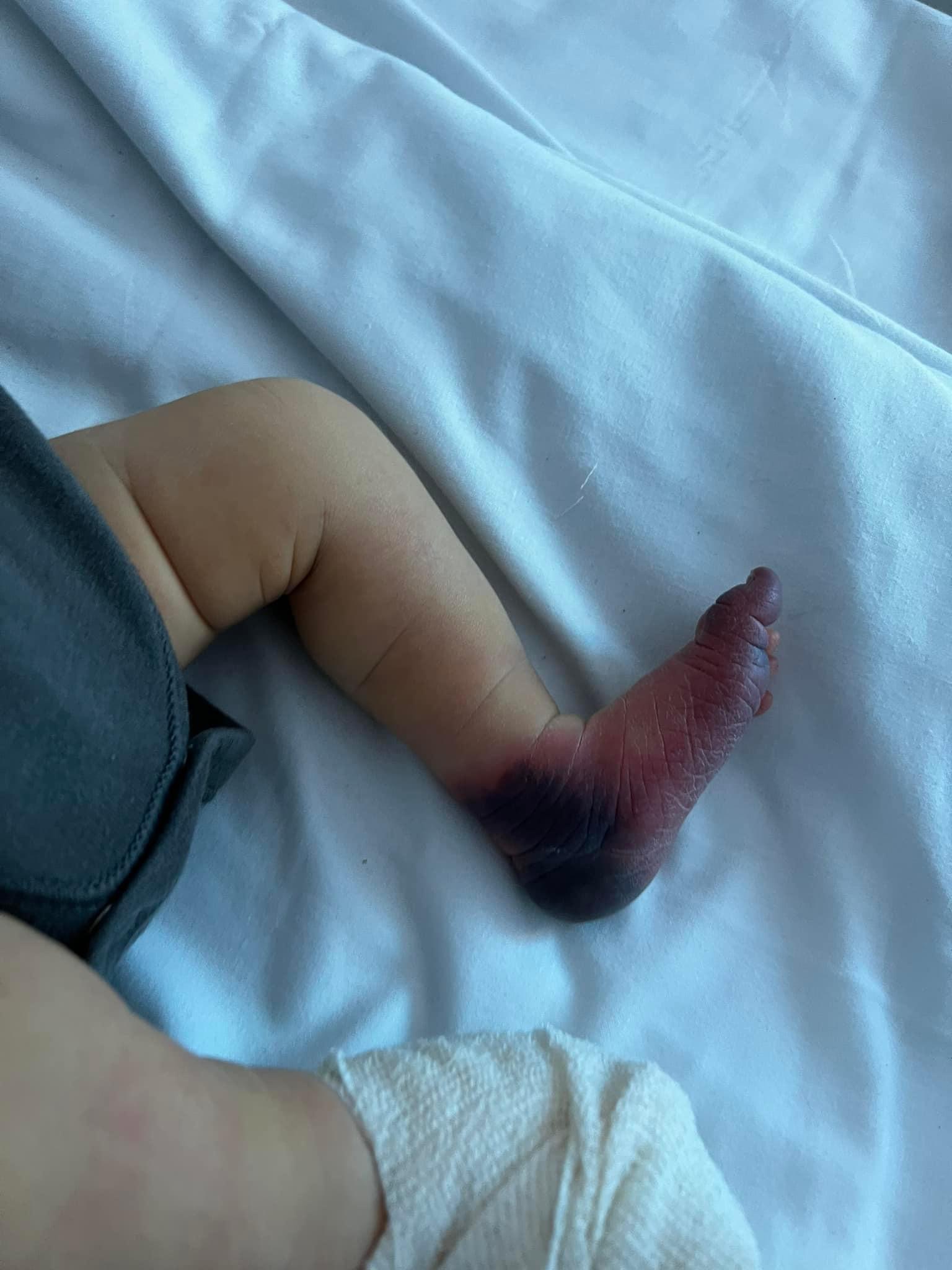The story of Hector
We had our son Hector on the 19th May 2023, he was a seemingly healthy baby and we couldn’t have been more smitten with him. On day 3 of life I was changing Hector’s nappy when I noticed his feet had gone black. It was one of those moments where the whole world moved in slow motion, I froze in terror and started to scream for my husband. 5 minutes later we were in the car on the way to A&E, at the hospital we were bypassed through A&E to the Paediatric Assessment Unit where they set us up in the Resus Room as they didn’t know how volatile my son’s condition would be. Blood tests showed my son was in acute liver failure and metabolic acidosis. They suspected his clotting had become deranged due to the liver failure and this was what had caused his feet to go black. They admitted they had no idea what was causing Hector’s condition or how to treat it.
A few hours later we were told they had no idea what was going on but they were blue-lighting us to the specialist Children’s Hospital 45mins away. We got set up on the HDU Liver ward at Birmingham Children’s Hospital where my son’s condition continued to deteriorate; they set him up on a cocktail of medicines to cover all eventualities, moved him on to a nil by mouth order and he began to receive blood products & Vitamin K treatment to help with his clotting. We were told his feet had developed in to a condition called purpura fulminans which is a necrotic condition. Hector’s lactates and other blood gases were not stabilising and so he was rushed to PICU late on the first night we were at Birmingham Children’s Hospital.
In PICU we were told that Hector was scheduled for surgery the next day to have a central line placed, 2 biopsies (one from his thigh to check his mitochondrial function and one from his lip to check his iron metabolism) & an MRI as blood tests alone were not bringing them any closer to the cause of Hector’s condition. We were seen by the transplant team who told us they were on stand by if the only solution was a liver transplant. Me and my husband had blood taken for genetic tests and Hector had an ultrasound of his head, chest and abdomen which also did not reveal any causes of his condition but did reveal more symptoms, most notably a grade 2 involuting brain haemorrhage. Hector’s feet began to blister because of the pressure of the blood building up under the skin and these blisters burst leaving awful open wounds all over his feet and ankles. They were still no closer to the answer and as best as we could, we tried to keep the worst case scenario thoughts at bay but there was a horrible nagging voice inside of me that kept saying I might not be taking my baby home with me.
The next day Hector was being prepped for surgery when a doctor came up from HDU Liver and told us they knew what the problem was. Hector has a very rare metabolic condition called galactosaemia, his liver cannot produce the GALT enzyme which breaks down the sugar galactose found in all animal milks including breast milk. Since Hector was exclusively breast fed his body had been overloaded with galactose and this had caused the liver failure, the metabolic acidosis and the subsequent purpura fulminans. His condition is autosomal recessive meaning me and my husband are carriers of the condition but have never known it in either of our families, Hector’s galactosaemia is only found in roughly 1 in 45,000 live births. The diagnosis came like a shining light and it meant we knew, for the first time in 3 days, that Hector was going to be coming home with us.
Within 4 days of diagnosis Hector was discharged from the hospital, his liver function was very nearly back to within normal range and his blood gases were much more stable. We were given training on how to look after the wounds on Hector’s feet and given a soya formula to feed him going forward & allowed to go home with him. It was a dream come true for us.
Hector’s condition comes with lots of associated symptoms such as motor issues, speech impediments, tremors, ataxia, developmental delay, intellectual disabilities, kidney issues etc. We were told some children do not present with symptoms at all and those who do present on a spectrum of severity so they can’t tell us how much support Hector will need, if any at all, in the future . Many of these symptoms can be managed with relevant therapies & treatment. Regardless of how much or how little support Hector needs as he grows and develops, we will always cherish him and we are going to spend the rest of our lives ensuring he knows how loved and supported he is. We wouldn’t change him for anything in the world, we are so lucky to be his parents.
